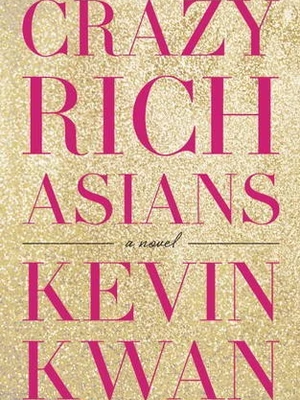Overview
In Crazy Rich Asians, Kevin Kwan tells the story of Rachel Chu, a smart, down-to-earth economics professor from New York who travels to Singapore with her boyfriend Nick Young for his best friend's wedding. What she doesn't know is that Nick comes from one of the wealthiest families in Asia, and his family has very specific ideas about who belongs in their world. I like this book because it shows how money, family, and tradition can shape the way people see themselves and each other.
Kwan takes us inside a world of private jets, massive estates, and extravagant parties, but the real story is about cultural identity, family pressure, and what it means to be "good enough." Rachel must navigate a world where her American upbringing and middle-class background make her an outsider, even though she genuinely loves Nick. Throughout this page, I'll connect the story to real questions about family expectations, self-worth, and staying true to yourself when others want to change you.
My Take: The "Belonging vs. Being Yourself" Framework
Most summaries just retell the plot and move on. I wanted this page to feel more like a "Belonging vs. Being Yourself" framework you can use in your own life. As you read, I'll keep nudging you to ask, "When have I felt like I had to choose between fitting in and staying true to who I am?"
I treat this book like a mirror for examining family expectations and cultural pressure. Rachel's story shows what happens when the people around you want you to be someone different, and how hard it is to hold onto your own identity when you're desperate to belong. You can use this same lens to look at your own relationships, asking, "Am I changing to please others, or am I being accepted for who I really am?"
Key Takeaways
Money Doesn't Buy Acceptance
For me, the core lesson is that wealth and status don't guarantee belonging. Rachel isn't rejected because she's unkind or unworthy, she's rejected because she doesn't come from the "right" family or the "right" background. This reminded me that some people will judge you based on things you can't control, and that's about them, not you.
Family Expectations Can Be Invisible Chains
The book shows how family obligations and traditions can control people's choices in powerful ways. Nick loves Rachel but struggles to stand up to his mother and extended family. It made me think about the unspoken rules in my own family and when it's worth breaking them to protect what matters most.
Cultural Identity Is Complicated
Rachel is Chinese American, but in Singapore she's seen as "not Chinese enough" or "too American." The story shows how cultural identity isn't simple, and how painful it can be when people decide you don't belong to a culture you claim as your own. This speaks to anyone who's ever felt caught between two worlds.
Self-Worth Comes From Within
By the end, Rachel has to decide if she's willing to compromise her values and identity to fit into Nick's world. Her choice shows that real self-worth means knowing when to walk away from people who make you feel like you're not enough. That's a lesson I carry into every relationship where I feel pressure to change.
Generational Differences Create Conflict
The clash between Nick's traditional mother and his more modern views shows how different generations see duty and love. Eleanor Young believes family comes first always, while Nick wants to choose his own path. This tension exists in many families, not just wealthy ones.
Chapter-by-Chapter Summary (Short & Simple)
Part One: The Discovery
The story begins with Rachel and Nick flying to Singapore for his best friend Colin's wedding. Rachel quickly realizes that Nick's family is far wealthier than she imagined, and that she's entering a world she doesn't understand. We meet the extended Young family, a sprawling network of cousins, aunts, and society figures who all have opinions about Nick's American girlfriend.
Part Two: Meeting the Family
Rachel experiences the full force of Singapore's elite society, from massive family estates to extravagant parties. Nick's mother, Eleanor, makes it clear that Rachel doesn't meet her standards, and other family members begin spreading rumors and testing Rachel's character. Meanwhile, we see glimpses of other relationships in Nick's world, showing how money, marriage, and social status are deeply intertwined.
Part Three: The Wedding and Aftermath
As Colin's wedding approaches, the pressure on Rachel intensifies. She faces direct confrontation from Eleanor, who tells her that she'll never be good enough for Nick and will only hold him back. Rachel must decide whether to fight for her relationship or walk away, and Nick must choose between his family's expectations and the woman he loves.
Key Character Arcs
Throughout the story, we also follow side characters like Astrid, Nick's glamorous cousin dealing with her own marriage problems, and Peik Lin, Rachel's college friend who becomes her guide to Singapore society. These storylines show different ways people navigate wealth, family pressure, and personal happiness, and they add depth to the main themes of the book.
Main Concepts
Old Money vs. New Money
One of the most interesting parts of the book is how it shows the difference between old money and new money in Asian society. The Young family and their circle represent old money, families who've been wealthy for generations and have strict rules about behavior, marriage, and social connections. Kwan shows how this creates a hierarchy even among the rich, where some people are considered more "refined" or "proper" than others based on family history.
The Matriarch's Power
Eleanor Young represents the power of matriarchs in traditional Asian families. She's not just Nick's mother, she's the guardian of family values and the one who decides who's worthy of joining the family. Her character shows how mothers in traditional cultures can wield enormous influence over their adult children's lives, especially in matters of marriage.
Face and Social Standing
The concept of "face", maintaining social standing and reputation, runs through the entire story. Characters make decisions based on how things will look to others, not just how they feel. This cultural value explains why Rachel's background matters so much to Nick's family, it's not just about her personally, it's about what her presence says about their family to the rest of society.
Love vs. Duty
At its heart, the book explores the tension between love and duty. Nick wants to marry Rachel because he loves her, but his family believes he has a duty to marry someone who enhances the family's status. This conflict isn't unique to wealthy families, many people face pressure to choose partners their families approve of, even when their hearts point elsewhere.
How to Apply the Ideas This Week
I don't want this to just be an entertaining story you read and forget. Here are a few ways I use the lessons from Crazy Rich Asians to examine my own relationships and choices. You can try them this week and see what insights come up.
- Identify your "Eleanor." Think about the people in your life whose approval you crave but struggle to get. Write down what they expect from you and ask yourself if those expectations are fair or if they're about their values, not yours.
- Check where you're compromising. Look at one important relationship and ask, "Am I changing core parts of who I am to fit in, or am I being myself and still feeling accepted?" Notice the difference between healthy compromise and losing yourself.
- Have one honest conversation. If you're facing family pressure about a big decision, career, relationship, or life path, try having one honest conversation where you express what you truly want. You might be surprised by the response.
- Practice saying "this isn't right for me." Find one small situation this week where you can practice turning down something that doesn't align with your values, even if it disappoints someone. Start small to build the muscle Rachel needed for her big decision.
Memorable Quotes
"You will never be enough."
"It's about the boy being willing to lose everything for the girl."
"All I can tell you is this: I know you think you understand what you're getting into, but you don't."
"Nick chose me. He chose love over tradition."
Who I Think Should Read This Book
- Anyone navigating family expectations: If you've ever felt pressure to meet your family's standards or choose between love and duty, Rachel's story will resonate deeply with you.
- People exploring cultural identity: If you're caught between cultures or have been told you're "not enough" of your heritage, this book shows you're not alone in that struggle.
- Readers interested in wealth and society: If you're curious about how extreme wealth shapes relationships and values, Kwan provides a fascinating, entertaining look inside that world.
- Those in cross-cultural relationships: If you're dating someone from a different background and dealing with family skepticism, this book offers both validation and cautionary lessons.
- Anyone who loves character-driven drama: If you enjoy stories with complex family dynamics, romantic tension, and social intrigue, this book delivers all of that in a compelling package.
What Other Readers Are Saying
I always like to see what other readers think before I commit to a book. On Goodreads, Crazy Rich Asians holds around 4.0 out of 5 stars from over 500,000 ratings, which shows strong reader engagement. Many readers praise the vivid world-building, the glamorous setting, and the way Kwan explores Asian culture and family dynamics with both humor and depth.
On Amazon, the book sits at approximately 4.3 out of 5 stars, with readers calling it "addictive," "eye-opening," and "impossible to put down." Some readers note that the large cast of characters can be overwhelming at first, and a few wish for even deeper character development. But most agree that the story is entertaining, the themes are meaningful, and it's refreshing to see Asian characters and culture take center stage in contemporary fiction.
-
Read reviews on Amazon:
Crazy Rich Asians on Amazon
* Affiliate link. I earn from qualifying purchases.
- Read reviews on Goodreads: Crazy Rich Asians on Goodreads
Final Thoughts
For me, the biggest gift of Crazy Rich Asians is that it makes the question of "belonging vs. being yourself" impossible to ignore. Rachel's journey forced me to examine my own relationships and ask, "Am I accepted for who I am, or only when I fit someone else's picture?" That's a question worth asking before you invest years in any relationship, romantic or otherwise.
If you use this summary as a framework for examining your own life, you'll walk away with more than just entertainment. You'll have real questions to ask about family expectations, cultural identity, and self-worth in your own relationships. And that's the real value of Rachel's story: not the glamour or the drama, but the reminder that you deserve to be loved for exactly who you are, not who someone else needs you to become.
Ready to Explore Rachel's Journey?
If this summary helped you, the full book is worth reading for the rich details, memorable characters, and emotional journey. You'll laugh, you'll cringe, and you'll think differently about family, belonging, and what it means to stay true to yourself.
Get Crazy Rich Asians on Amazon* Affiliate link. I earn from qualifying purchases.

